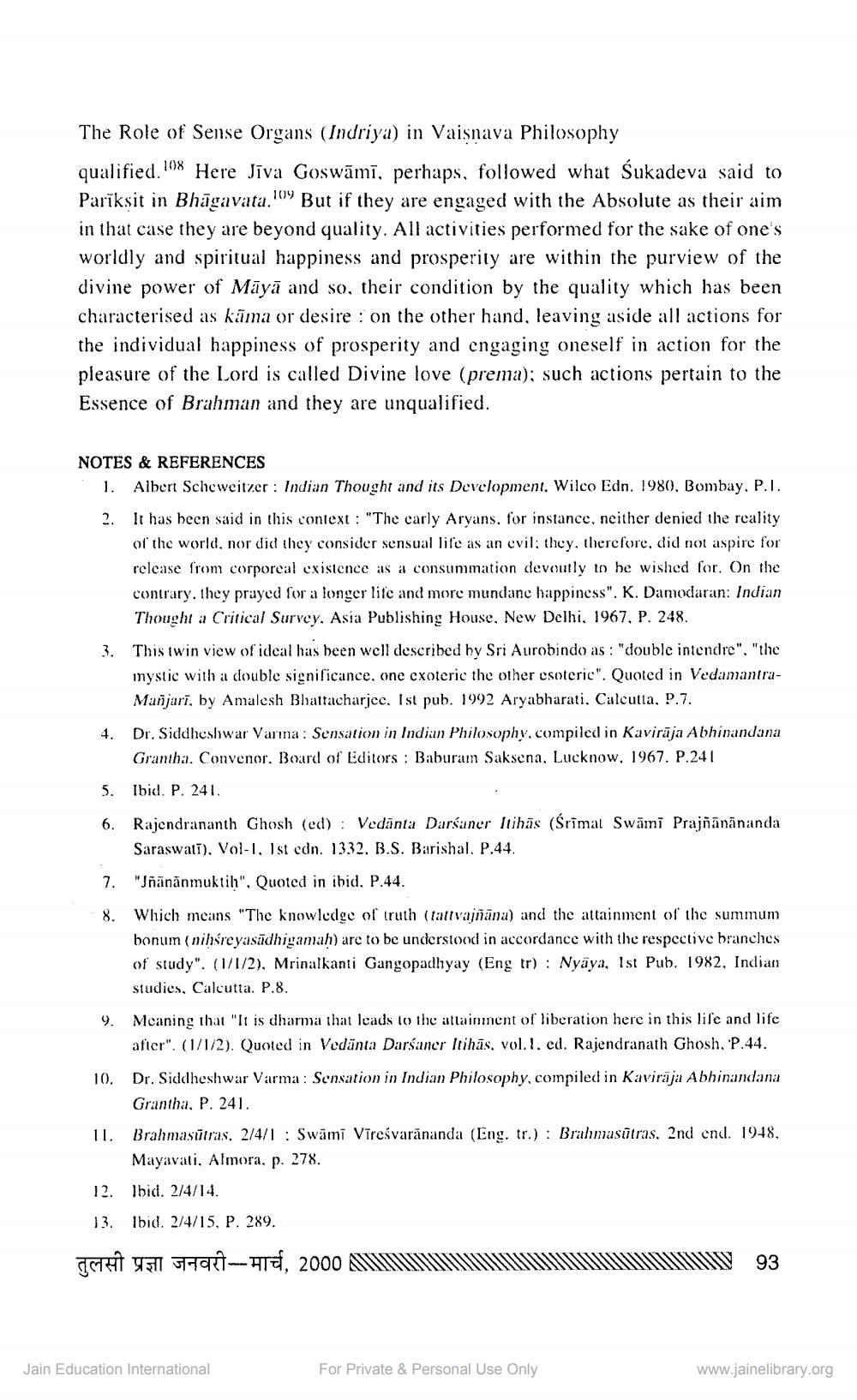________________
The Role of Sense Organs (Indriya) in Vaisnava Philosophy
qualified.108 Here Jiva Goswāmī, perhaps, followed what Sukadeva said to Pariksit in Bhagavata.'' But if they are engaged with the Absolute as their aim in that case they are beyond quality. All activities performed for the sake of one's worldly and spiritual happiness and prosperity are within the purview of the divine power of Māyā and so, their condition by the quality which has been characterised as kāma or desire : on the other hand, leaving aside all actions for the individual happiness of prosperity and engaging oneself in action for the pleasure of the Lord is called Divine love (prema); such actions pertain to the Essence of Brahman and they are unqualified.
NOTES & REFERENCES
1. Albert Schweitzer : Indian Thought and its Development. Wilco Edn. 1980, Bombay, P.I. 2. It has been said in this context: "The carly Aryans, for instance, neither denied the reality
of the world, nor did they consider sensual life as an evil; they, therefore, did not aspire for release from corporeal existence as a consummation devoutly to be wished for. On the contrary, they prayed for a longer life and more mundane happiness". K. Damodaran: Indian
Thought a Critical Survey, Asia Publishing House, New Delhi, 1967, P. 248. 3. This twin view of ideal has been well described by Sri Aurobindo as : "double intendre". "the
mystic with a double significance, one cxoteric the other esoteric". Quoted in Vedamantra
Manjari, by Amalesh Bhattacharjee. Ist pub. 1992 Aryabharati, Calcutta, P.7. 4. Dr. Siddheshwar Varina : Sensation in Indian Philosophy.compiled in Kavirāja Abhinandana
Grantha. Convenor. Board of Editors : Baburam Saksena, Lucknow. 1967. P.241 5. Ibid. P. 241.
Rajendrananth Ghosh (ed): Vedānta Darśaner Tuihäs (Srimat Swami Prajñānānanda Saraswati), Vol. I. Ist edn. 1332. B.S. Barishal. P.44.
"Jñananmuktil", Quoted in ibid, P.44.
8. Which means "The knowledge of truth (tattvajñāna) and the attainment of the summum
bonum (nihreyasādhigamah) are to be understood in accordance with the respective branches of study". (1/1/2), Mrinalkanti Gangopadhyay (Eng tr): Nyāya, Ist Pub. 1982, Indian
studies, Calcutta, P.8. 9. Meaning that "It is dharma that leads to the attaininent of liberation here in this life and life
afier". (1/1/2). Quoted in Vedānta Darśaner Itinās, vol. I. ed. Rajendranath Ghosh, P.44.
10. Dr. Siddheshwar Varma: Sensation in Indian Philosophy, compiled in Kaviraja Abhinandana
Grantha, P. 241. 11. Brahmasūtras. 2/4/1 : Swami Vireśvarānanda (Eng. tr.) : Brahmasūtras, 2nd end. 1948,
Mayavati, Almora, p. 278. 12. Ibid. 2/4/14.
13. Ibid. 2/4/15, P. 289. de 51 52-HTE, 2000 AWWWWMWM MMM 93
Jain Education International
For Private & Personal Use Only
www.jainelibrary.org




